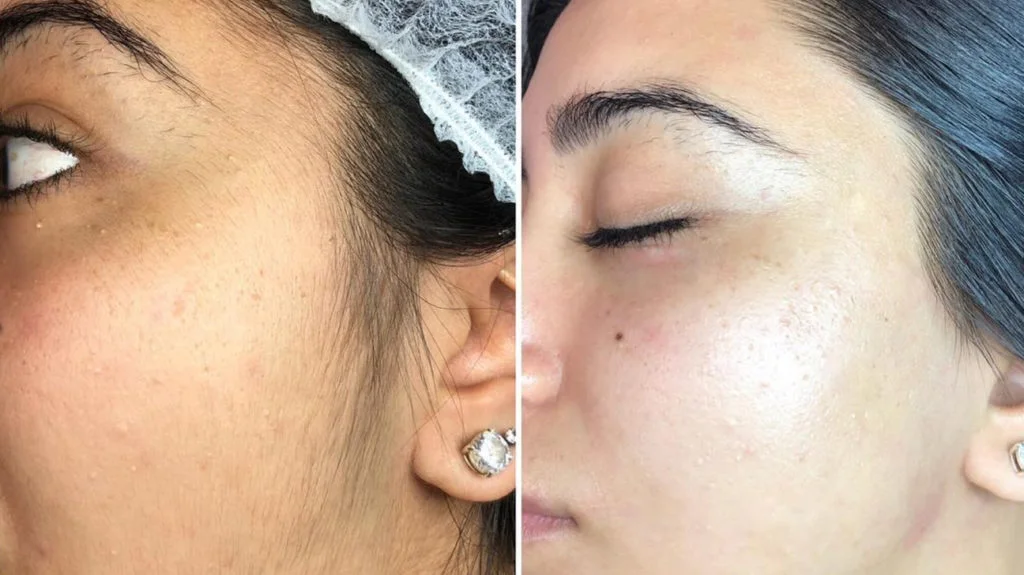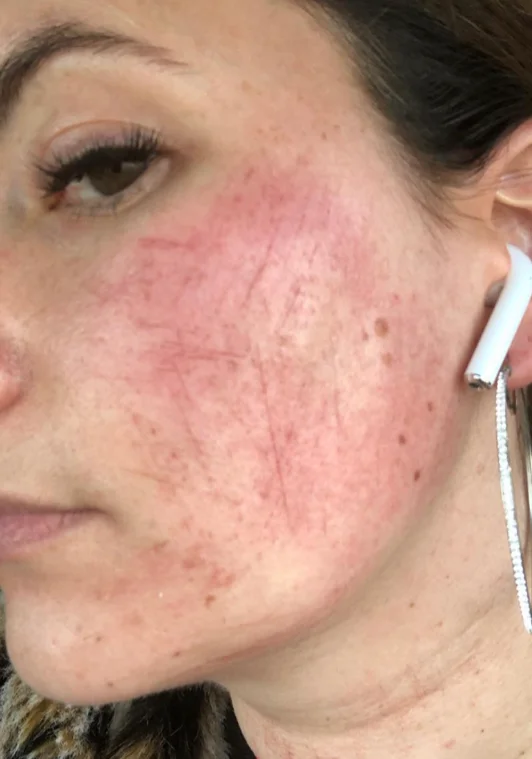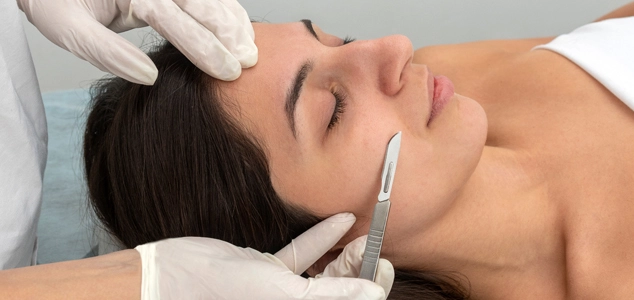Table of Contents
There is an extra growth of extremely fine and downy hair on our faces, mostly common among women, called peach fuzz or more appropriately vellus hair.
These peach fuzz a.k.a vellus hair have been leading most people into becoming insecure and developing low self-esteem; while they also tend to get denser as we age, or at times due to an illness called polycystic ovary syndrome.
You surely must have come across “Dermaplaning” if you have ever tried surfing the internet in search of treatments that can help females with facial hair removal. It can be introduced as an instant treatment that involves the shaving of female facial hair using a specifically designed dermaplaning razor.
While this treatment has proven to be quite effective when it comes to attaining smooth hairless skin, and its non-invasive nature makes it even better – However, dermaplaning does have its adverse effects too; which might not occur every time, but can be seen frequently. Additionally, for those seeking to enhance their facial appearance further, the lip flip NYC treatment is an excellent option
What is Dermaplaning?
Being an immensely safe and completely non-surgical cosmetic treatment, Dermaplaning consists of the top layer of the skin being removed to bring out the fresh and smooth skin present under it. An aesthetician carefully carries out this procedure with the use of a specifically designed scalpel that exfoliates the targeted skin by scraping off the dead skin cells, leading to a glowing and youthful outlook for the skin.
Is Dermaplaning Good Or Bad For Acne?
Dermaplaning can be beneficial for acne-prone skin as it exfoliates the surface, reducing the appearance of acne scars and helping products penetrate better. This process also helps to remove dead skin cells.
Does Dermaplaning Cause Acne?
Dermaplaning itself does not typically cause acne. However, some considerations could potentially lead to breakouts post-treatment:
-
Irritation
Improper technique or aggressive scraping during dermaplaning can irritate the skin, potentially triggering acne in sensitive individuals.
-
Pore Clogging
If the tools used are not properly sanitized or if skincare products applied post-treatment are comedogenic (pore-clogging), this could lead to clogged pores and acne breakouts.
To minimize the risk of acne after Dermaplaning, it’s important to ensure the procedure is performed by a trained professional using sterile tools and to follow a suitable skincare regimen afterward, including non-comedogenic products.
Does Dermaplaning Cause Fungal Acne?
No, Dermaplaning does not cause fungal acne. It primarily addresses surface-level skin concerns and does not affect fungal acne conditions.
Does Dermaplaning Cause Cystic Acne?
No, Dermaplaning does not directly cause cystic acne. However, any irritation or pore-clogging post-treatment could potentially exacerbate acne.
Does The Frequency of Dermaplaning Affect Acne?
Yes, frequent Dermaplaning might irritate sensitive or acne-prone skin. It’s advisable to consult with a dermatologist for personalized advice.
How Long After Dermaplaning Can I Wash My Face?
After dermaplaning, it’s generally recommended to wait at least 6 to 8 hours before washing your face. This allows the skin to recover and reduces the risk of irritation or sensitivity, especially if the procedure caused any minor abrasions or redness. When you do wash your face, use a gentle cleanser and avoid harsh scrubbing or exfoliation.
Pros And Cons Of Dermaplaning
|
Pros |
Cons |
|
Smoother skin texture |
Risk of irritation or cuts |
|
Enhanced product absorption |
Temporary redness or sensitivity |
|
Reduction of fine facial hair |
Potential for post-treatment breakouts |
What Are The Side Effects of Dermaplaning?
The side effects of Dermaplaning are typically mild and temporary. They may include:
- Redness: Some temporary redness of the skin immediately after the procedure.
- Sensitivity: Skin may feel more sensitive than usual, especially to touch.
- Dryness: Temporary dryness of the skin, which can be alleviated with moisturizer.
- Rarely, minor cuts or abrasions: If the procedure is not performed correctly or if the tools used are not properly sanitized.
How To Avoid Acne Breakouts After Dermaplaning?
To avoid breakouts after Dermaplaning, follow these tips:
- Use Non-Comedogenic Products
- Avoid Touching Your Face
- Keep Skin Clean
- Moisturize
- Sun Protection
- Avoid Harsh Products
- Follow Aftercare Instructions
How To Treat Acne After Dermaplaning?
Treating acne after Dermaplaning involves gentle care to avoid aggravating the skin post-treatment. Here’s how to effectively manage acne:
- Cleanse Gently
- Apply Acne Treatments
- Moisturize
- Avoid Touching or Picking
- Sun Protection
What To Do After Dermaplaning?
Apply soothing skincare products, like a hydrating serum or moisturizer, and protect the skin from sun exposure.
Why Do I Break Out After Dermaplaning?
Breakouts may occur due to irritation, improper aftercare, or using comedogenic products that clog pores.
What To Expect After Dermaplaning?
Expect smoother skin texture, improved product absorption, and a temporary glow. Mild redness or sensitivity may occur immediately after treatment.
What Should One Consider Before Deciding To Undergo Dermaplaning?
Consider your skin type, potential risks, and benefits, and consult with a qualified skincare professional. For visuals like Dermaplaning before and after photos or to find the best medical aesthetics services in Manhattan, NYC, consider searching online directories or platforms specializing in aesthetic treatments. Always consult with a qualified professional for personalized advice on skincare treatments and post-procedure care.
Dermaplaning Before And After

Dermaplaning Regret

Best Dermaplane

Can I Use Retinol After Dermaplaning?
Yes, but it’s advisable to wait at least 24 hours after Dermaplaning to apply retinol to avoid irritation.
Can I Use Salicylic Acid After Dermplaning?
No, it’s best to avoid using salicylic acid immediately after Dermaplaning, as it may irritate the freshly exfoliated skin.
Can I Use Toner After Dermaplaning?
Yes, you can use a gentle toner after Dermaplaning, but opt for alcohol-free and soothing formulas to avoid irritation.
Can I Exercise After Dermaplaning?
Yes, you can exercise after Dermaplaning. However, it’s advisable to wait at least 6 to 8 hours to allow the skin to recover.
Can I Use Snail Mucin After Dermaplaning?
Yes, snail mucin can be used after Dermaplaning as it has hydrating and soothing properties beneficial for radiant skin.
Can I Use A Face Mask After Dermplaning?
Yes, you can use a hydrating or soothing face mask after Dermaplaning to further nourish the skin. Choose a mask suitable for sensitive skin.
Can I Use Tea Tree Oil After Dermaplaning?
No, it’s best to avoid using tea tree oil immediately after Dermaplaning as it may be too harsh on the freshly exfoliated skin.
Can I Use Micellar Water After Dermaplaning?
Yes, you can use micellar water after Dermaplaning to gently cleanse the skin. Opt for a mild and alcohol-free formulation.
Where To Find The Best Medical Aesthetics Services in Manhattan, NYC?
For excellent Dermaplaning and medical aesthetics services in Manhattan, consider Syra Aesthetic, known for its specialized treatments and skilled practitioners. They offer personalized skincare solutions in a luxurious setting, ensuring top-notch results and client satisfaction. Booking a consultation with Syra Aesthetic can provide tailored recommendations for your skincare needs.
Frequently Asked Questions
Does dermaplaning hurt sensitive skin?
Dermaplaning may cause discomfort for sensitive skin due to its exfoliation method involving a surgical scalpel. Proper technique and gentle handling can minimize discomfort.
Does dermaplaning cause pimples?
Dermaplaning itself does not typically cause pimples. However, improper technique or post-treatment skincare could potentially lead to breakouts in some individuals.
Is dermaplaning good for blackheads?
Yes, Dermaplaning can be effective for removing superficial dead skin cells and unwanted facial hair, which may help reduce the appearance of blackheads and make skin smoother.
Why is Dermaplaning bad?
Dermaplaning is generally safe when performed by a trained professional. However, it may not be suitable for individuals with active acne, sensitive skin prone to irritation, or certain skin conditions.
Why does dermaplaning cause active acne?
Dermaplaning can cause active or cystic acne if the blade used during the exfoliation treatment spreads bacteria across the skin or if the exfoliation process irritates sensitive skin, leading to inflammation and potential breakouts.
How do dead skin cells affect the appearance?
Dead skin cells can make the skin appear dull, rough, and uneven in texture. They can also clog pores, leading to blackheads, whiteheads, and acne breakouts, affecting overall skin clarity and radiance.
What happens if you Dermaplane too much?
Dermaplaning too frequently can lead to irritation, redness, and sensitivity. It may also compromise the skin’s barrier function, causing dryness and potentially exacerbating conditions like acne or rosacea.
What happens if you stop Dermaplaning?
If you stop Dermaplaning, your skin will gradually return to its natural exfoliation process. Dead skin cells will shed naturally, and any temporary smoothness from dermaplaning will fade over time.
Should I moisturize before Dermaplaning?
Yes, moisturizing before Dermaplaning helps hydrate and soften the skin, making the procedure smoother and reducing the risk of irritation or microtears.
What steps should be followed for optimal Dermaplaning aftercare form?
For optimal Dermaplaning aftercare, avoid sun exposure, use gentle cleansers, apply hydrating serums, moisturize, and use sunscreen daily to protect and nourish the skin post-treatment.
————————————————-
– Disclaimer –
This blog is for informational & educational purposes only and does not intend to substitute any professional medical advice or consultation.
For any symptoms or medical advice, please consult with your physician,
Or Book an appointment with our board-certified aestheticians at Syra Aesthetics.

-
About The Author
Dr. Syra Hanif M.D.Board Certified Primary Care Physician
Dr. Hanif is the Director of Aesthetic Medicine. She is a board-certified physician in Aesthetic Medicine who specializes in using non-surgical alternatives in order to enhance one's appearance through Botox and fillers.
Read More


